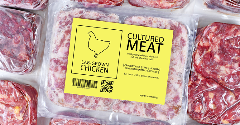News
Monterey Mushrooms gets EU approval for vitamin D-rich mushroom powder
16 Jun 2022Monterey Mushrooms’ vitamin D-rich mushroom powder, produced using ultraviolet (UV) to boost the nutrient content, can be sold in the EU, following novel food approval from the European Food Safety Authority (EFSA).
Monterey Mushrooms, a California-based mushroom producer, has successfully received novel food approval from EFSA for its vitamin D mushroom powder, in line with Regulation (EU) 2015/2283.

Using UV light to create vitamin D-rich mushrooms
The product, branded Just Mushrooms, is a whole-food, vegan-friendly powder containing high levels of vitamin D. Created from US-grown and processed dehydrated mushrooms, the powder is available in a range of vitamin D levels, ranging from 125–375 µg/g.
Through a collaboration with the US Department of Agriculture (USDA), Monterey has developed a method of specially devised proprietary ‘sunlight’, which uses ultraviolet rays on Agaricus bisporus mushrooms, to replicate the vitamin D-rich sunlight that mushrooms require to grow, in an indoor environment. The UV light induces the conversion of provitamin D2 (ergosterol) to vitamin D2 (ergocalciferol).
This eliminates the need for additives, supplements, or chemicals often used during traditional mushroom production processes, all the while creating mushrooms which are high in vitamin D.
EFSA approved specifications of use
Following the EFSA approval, the mushroom powder can be used as an ingredient in a variety of foods and beverages in amounts that result in either 1.125 or 2.25 µg of vitamin D2 per 100 g or 100 ml of the food as consumed, EFSA confirmed in its scientific opinion.
Additionally, EFSA approved the ingredient for foods for special medical purposes (FSMPs) and meal replacement for weight control. According to the EFSA analysis, the maximum intended use level in FSMPs is 15 µg vitamin D2 per day and 5 µg vitamin D2 per meal, for products of this use intended for adult consumption.
Conversely, for infants (aged 7 – 11 months) and for children (aged over 1 year), a maximum of 10 µg vitamin D2 per day and of 15 µg vitamin D2 per day was authorised as per the approval.
Despite confirming the safe use of the ingredient in line with the above stated conditions of use, the Panel raised caution around the calculated combined exposure of vitamin D for the general population, in light of the recent growth in and popularity of vitamin D-fortified foods available on the market.
Consumers are looking to increase their vitamin D intake
Vitamin D is essential for maintaining good human health, yet studies show that more than one in four (42%) Americans do not have an adequate amount of it in their diets. Deficiency of vitamin D can have serious implications on health, including an increased risk of developing certain forms of cancer and diabetes, in addition to bone and muscular health problems such as arthritis and muscular sclerosis.
Over recent years, consumers across the globe have become more health conscious and are increasingly seeking ways to improve the nutritional value of their diets.
Given the clear health implications of vitamin D deficiency, the demand for supplements and products which allow consumers to add higher levels of concentrated vitamin D into their diet is on the rise. Between 2020 – 2021, vitamin D usage amongst US consumers grew from 42% – 52%, potentially as a result of studies highlighting the links between vitamin D intake and the effects of Covid-19.
Related news

‘Health’ labels on products reduce consumers’ willingness to pay
10 Mar 2025
A study into front-of-packaging “health” labelling finds that these labels alone can lower US consumers’ willingness to pay.
Read more
Food industry lags on healthier product formulation, nutrition index finds
7 Mar 2025
The world’s biggest food manufacturers derive just 34% of their sales from healthier products, according to the 2024 Global Access to Nutrition Index.
Read more
Does calorie labelling lead to reduced consumption?
27 Feb 2025
Calorie labelling of food products leads to a small, but consistent, reduction in the number of calories consumed, a study suggests.
Read more
F&B industry hit with fresh greenwashing claims
26 Feb 2025
The food and beverage (F&B) industry is under fresh scrutiny amid claims of greenwashing, with Arla the latest company in the firing line.
Read more
Have scientists discovered a new tool to measure UPFs?
19 Feb 2025
Researchers have developed a new scoring system and database, compiling over 50,000 food items, of which over 1,000 are classified as ultra-processed.
Read more
Singapore explores farmland-free food production
17 Feb 2025
Researchers discover new technology replicating on-farm food production conditions from within the indoor lab environment.
Read more
Most consumers lack trust in AI, but supplement users are ready to embrace the technology
14 Feb 2025
A survey of UK and US consumers found that most supplement users are willing to let AI make decisions on their behalf, but they also demand greater transparency.
Read more
Indians enjoy first bites of cultivated chicken
13 Feb 2025
The first public tasting of cultivated meat in India has taken place as the country prepares for the first commercial cultivated meat products – potentially as early as the end of this year.
Read more
Disruptor brands spearhead sustainable solutions
11 Feb 2025
Manufacturers, big and small, sharpen their focus by providing sustainable products and services centred on comprehensive and sustainable approaches to traditional methods.
Read more
The future of UPF regulation: Stricter labelling, more taxation, and no more conflicts of interest?
10 Feb 2025
Policymakers are intensifying efforts to regulate ultra-processed foods (UPFs), as mounting evidence links their consumption to increased risks of obesity, cardiovascular disease, and other chronic health issues.
Read more